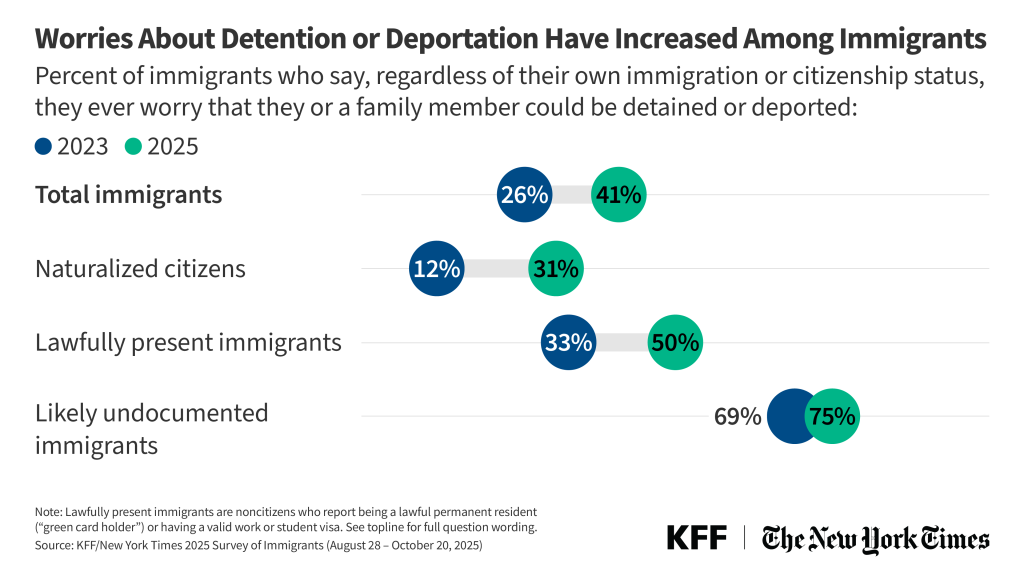Immigrants Report Rising Fear, Negative Economic and Health Impacts, and Changing Political Views During the First Year of President Trump’s Second Term
KFF/New York Times Poll Highlights Views and Experiences of Immigrants Amid Intensified Immigration Enforcement Efforts
A new KFF/New York Times Survey of Immigrants reveals deepening anxiety and fear among immigrants of all statuses amid the Trump administration’s intensified immigration enforcement and restrictive policies. The survey paints a portrait of families under strain—where fear of detention and economic instability are negatively impacting immigrants’ health and reshaping immigrant families’ daily lives and views of U.S. political parties.
The partnership survey builds on KFF’s groundbreaking work surveying immigrants over the past few years, including a 2023 survey in partnership with the Los Angeles Times, a 2024 survey during the presidential election cycle, and a survey earlier this year that was paired with a focus group report on the experiences of undocumented immigrant families. As of June 2025, there were 51.9 million immigrants living in the U.S.
Findings from the new survey are detailed in three KFF reports and help inform the reporting in a package of news stories released by the New York Times. One KFF report focuses on the worries and experiences of immigrants amid increased immigration enforcement, a second examines the political views of immigrant voters, and a third probes the health and health care experiences of immigrants.
The survey finds that more than one in five (22%) immigrants personally know someone arrested, detained, or deported for immigration-related reasons since the president’s return to office—nearly triple the share from April 2025. Forty-one percent of immigrants now fear they or a family member could be detained or deported, up sharply from 26% in 2023. Fear has increased the most among lawfully present immigrants and naturalized citizens, indicating that growing unease is not confined to those who are undocumented.

About half of immigrants – across all statuses – report feeling less safe since the president’s second term began. Three in ten immigrants say they or a family member avoid traveling, working, going to other public spaces, or seeking medical care because of fear of enforcement since January. Among likely undocumented immigrants, this avoidance rises to three in four. More than half of immigrants (53%) lack confidence they would be treated fairly if detained.
About one in ten eligible U.S. voters today are naturalized citizens. In the current climate, nearly six in ten immigrant voters say their views on the Trump administration’s immigration policies have had an impact on which political party they support — including over four in ten who say they have had a “major impact.”
When immigrant voters are asked to describe how the administration’s immigration policies have impacted which party they support, a larger share express views that reflect negative views of these policies or a shift away from Republicans (36%) than express views in support of these policies or the Republican party (19%).
Among other key findings:
- Most immigrants still say their own lives are better for coming to the U.S., and most would come again. But while about one-third say the U.S. is a great place for immigrants, nearly twice as many (60%) say the country used to be a great place for immigrants, but that’s no longer true.
- About half of immigrants report struggling to pay for housing, food, or health care—up from 31% in 2023. Many say it’s become harder to earn a living since January.
- Four in ten (40%) immigrant adults overall and nearly eight in ten (77%) likely undocumented immigrants say they have experienced negative health impacts since January 2025 due to immigration-related worries. These include increased stress, anxiety, or sadness; problems sleeping or eating; and/or worsening health conditions like diabetes or high blood pressure. About one in five (18%) immigrant parents say that their child’s well-being has been impacted due to immigration-related worries since January 2025.
- The share of immigrant adults who reported skipping or postponing health care in the past 12 months increased from 22% to 29% between 2023 and 2025. Among those who went without care, about one in five (19%) say it was due to immigration-related concerns. About three in ten (30%) immigrant parents say that any of their children delayed or skipped health care in the past 12 months due to immigration-related fears, cost or lack of insurance, and/or not being able to find services at a convenient time or location, rising to about six in ten (58%) of parents who are likely undocumented.
The KFF/New York Times 2025 Survey of Immigrants is a probability-based, nationally representative survey of 1,805 immigrant adults (U.S. adults born outside the U.S) conducted between August 28 – October 20, 2025. Respondents were contacted online, by mail, and by telephone, and had the choice to complete the survey in English, Spanish, Chinese, Korean, Vietnamese, and Haitian Creole. The margin of sampling error is plus or minus 3 percentage points for results based on the full sample.
